| Author |
Message |
|
Tim Lison
|
 Posted: Mon 14 Apr, 2014 9:22 am Post subject: Robert Moc Piast type sword Posted: Mon 14 Apr, 2014 9:22 am Post subject: Robert Moc Piast type sword |
 |
|
I have recieved my newest sword from Robert Moc and thought I would share some photos. I have been interested in Baltic area swords of the 10th and 11th century lately which is where this one hails from. It is a specific Polish type, according to Lech Marek in his book "Early Medieval Swords from Central and Eastern Europe", of which this sword is on the cover. The distinguishing factor of a Piast type sword is that the hilt fittings are made from horn. In this case Robert carved them from 3 solid black pieces of horn. I am extrememly happy with the results. It's clear to see why Robert is one of the top, if not the top, swordsmiths available today. This sword is a work of art!
Stats:
OAL 39 inches
BL 32 inches
POB 6.5 inches from guard
It handles like a dream, although I am a bit hesitant to swing it around since the hilt is made from horn. I don't want to crack it, although it seems very sturdy no reason to press my luck. I especially like the contrast between the silver wire grip and the black horn. The scabbard is also a masterpiece, wool lined, wood core, covered in red leather with custom made fittings. I couldn't be happier with this piece.
I couldn't be happier with this piece. I have included some photos I took and one studio shot from Robert. There are more studio shots here:
http://www.robert-moc.sk/pages/gallery/mec-s-...tor577.php
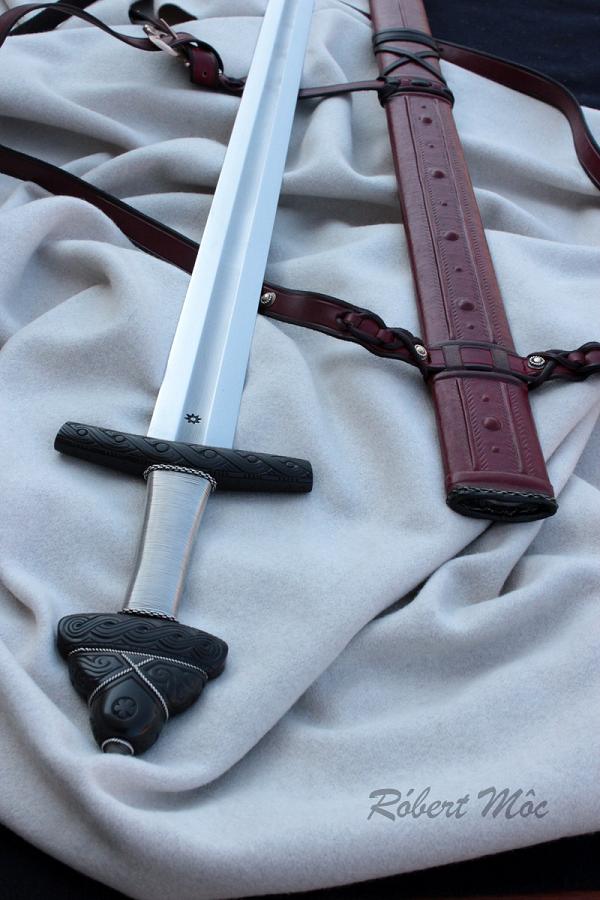
 Attachment: 30.11 KB Attachment: 30.11 KB
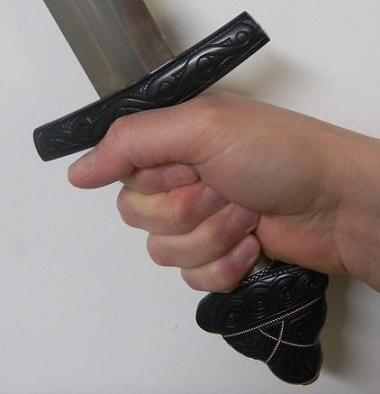
 Attachment: 34.04 KB Attachment: 34.04 KB
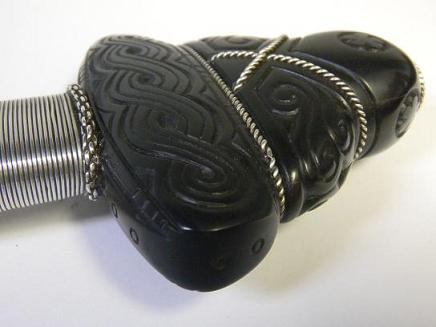
 Attachment: 26.57 KB Attachment: 26.57 KB
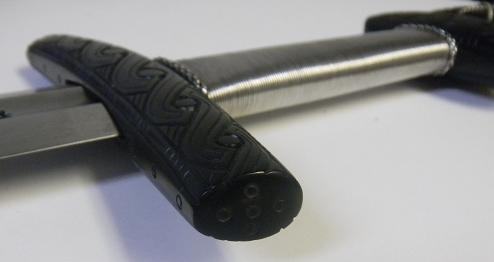
 Attachment: 29.16 KB Attachment: 29.16 KB
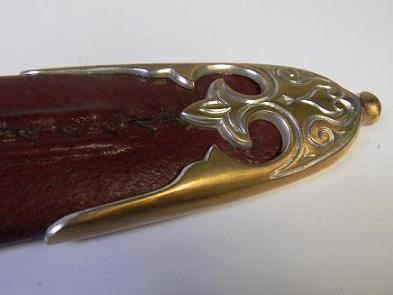
 Attachment: 34.21 KB Attachment: 34.21 KB
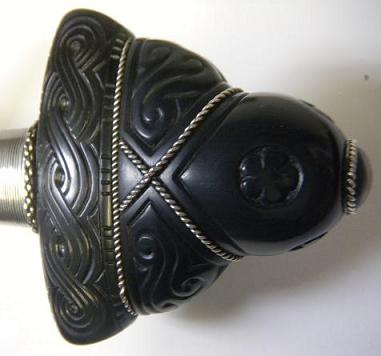
 Attachment: 32.62 KB Attachment: 32.62 KB
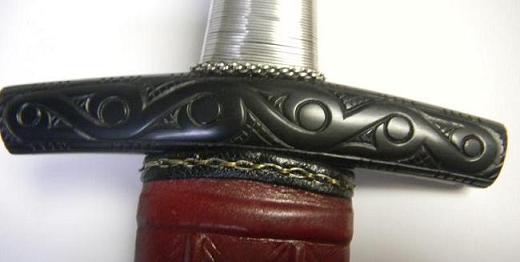
 Attachment: 84.23 KB Attachment: 84.23 KB
[ Download ]
|
|
  |
 |
J.D. Crawford

|
 Posted: Mon 14 Apr, 2014 10:00 am Post subject: Posted: Mon 14 Apr, 2014 10:00 am Post subject: |
 |
|
Congratulations Tim! That's a very unique and impressive piece.
Going by memory, I don't recall any surviving wire grip on the original. What guided that choice?
And what about the color of the horn? Is that natural or was it finished to be black? What type of horn is this? Is it known what type of horn was used on the original?
|
|
   |
 |
|
Tim Lison
|
 Posted: Mon 14 Apr, 2014 10:29 am Post subject: Posted: Mon 14 Apr, 2014 10:29 am Post subject: |
 |
|
|
I think Robert said it was black buffalo horn. The horn is naturally black. I'm not sure about the horn on the original and it was unfortunately destroyed in WW2. As for the grip, the contrast between the black and the white was what led to that choice. I thought it would be nice to echo the silver of the wire in the pommel too. Cam e out very well, I think!
|
|
  |
 |
|
Mark Griffin
Location: The Welsh Marches, in the hills above Newtown, Powys. Joined: 28 Dec 2006
Posts: 802
|
 Posted: Mon 14 Apr, 2014 11:30 am Post subject: Posted: Mon 14 Apr, 2014 11:30 am Post subject: |
 |
|
Good grief that's lovely. A fine bit of work and definitely the sword as art.
The black horn works so well with the silver wire, its inspired me on how to get a lovely matched pair of horns I have here, want a hunting and drinking set, def get them finished in silver now, lovely.
Currently working on projects ranging from Elizabethan pageants to a WW1 Tank, Victorian fairgrounds 1066 events and more. Oh and we joust loads!.. We run over 250 events for English Heritage each year plus many others for Historic Royal Palaces, Historic Scotland, the National Trust and more. If you live in the UK and are interested in working for us just drop us a line with a cv.
|
|
  |
 |
Matthew G.M. Korenkiewicz

|
 Posted: Mon 14 Apr, 2014 12:41 pm Post subject: Posted: Mon 14 Apr, 2014 12:41 pm Post subject: |
 |
|
Hmmm, sword looked familiar ... similar to this one, a picture in a book I have called
Polish Arms / Side Arms by Andrzej Nadolski ... no mention could I find of the hilt
being made of horn, though ...

It says ... | Quote: | | Sword of the 11th century found at Czersk Polski near Bydgoszcz |
...
Is this similar or " the " sword, TL ?
And ... what would be the reason for a hilt made of horn ? is it just a ceremonial sword, or
something else ?
|
|
  |
 |
Bryan Heff

|
 Posted: Mon 14 Apr, 2014 1:41 pm Post subject: Posted: Mon 14 Apr, 2014 1:41 pm Post subject: |
 |
|
Very very interesting. I initially misread it thinking you said carved from iron...which was not computing in my tiny brain 
Very cool sword. Congratulations.
The church is near but the roads are icy. The tavern is far but I will walk carefully. - Russian Proverb
|
|
  |
 |
|
Tim Lison
|
 Posted: Mon 14 Apr, 2014 1:57 pm Post subject: Posted: Mon 14 Apr, 2014 1:57 pm Post subject: |
 |
|
| Matthew G.M. Korenkiewicz wrote: | Hmmm, sword looked familiar ... similar to this one, a picture in a book I have called
Polish Arms / Side Arms by Andrzej Nadolski ... no mention could I find of the hilt
being made of horn, though ...
It says ... | Quote: | | Sword of the 11th century found at Czersk Polski near Bydgoszcz |
...
Is this similar or " the " sword, TL ?
And ... what would be the reason for a hilt made of horn ? is it just a ceremonial sword, or
something else ? |
Same sword. Here are some more pics, including a drawing of both sides which are different. I have no idea why the swords were hilted in horn but in Marek's book there are a few examples. This one was well documented as having been hilted in horn before it's destruction in WW2. This type of horn hilt and carving seemed to be localized to an area in Poland although there have been many other finds with organic hilt components, including horn. It seems many of them have been used in combat, can't really say about this one, but I don't see why it couldn't have been? Maybe they did it for the bling factor? Kind of a common theme in weapons from the Dark Ages, highly decorated weapons...
Also, here is a link to Marek's book in the bookstore:
http://www.myArmoury.com/books/item.8322926243.html
It is a great read and has a lot of great photos.
 Attachment: 19.93 KB Attachment: 19.93 KB
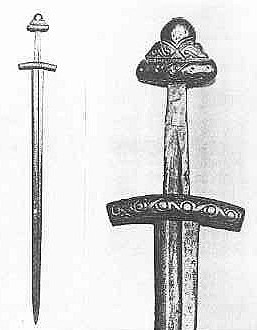
 Attachment: 26.28 KB Attachment: 26.28 KB
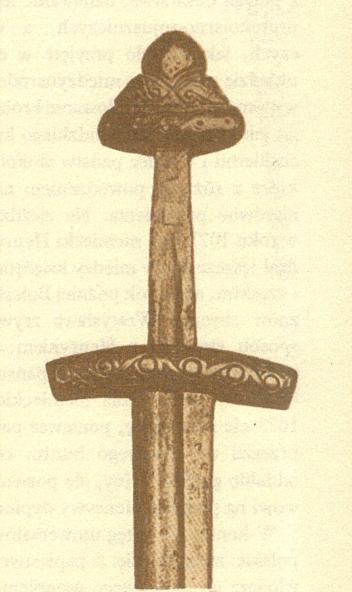
 Attachment: 19.16 KB Attachment: 19.16 KB
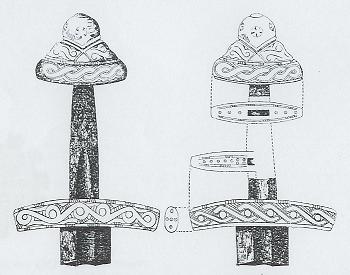
|
|
  |
 |
Leo Todeschini
Industry Professional

|
|
   |
 |
|
Tim Lison
|
 Posted: Mon 14 Apr, 2014 10:25 pm Post subject: Posted: Mon 14 Apr, 2014 10:25 pm Post subject: |
 |
|
|
The balance point is a bit further out than it would be if it had iron fittings. The blade is so well made (no surprise) that it feels excellent in hand. It's a slim blade with a fair amount of distal taper which must compensate a bit for the lack of weight in the hilt. It handles great!
|
|
  |
 |
Jerry Monaghan

|
 Posted: Mon 14 Apr, 2014 11:59 pm Post subject: Posted: Mon 14 Apr, 2014 11:59 pm Post subject: |
 |
|
Hi Tim.
Congratulations that is truly an masterpiece I relay like this one and yes Roberts attention to detail however so small is fantastic and his workmanship is superb as is his knowledge on this kind of sword.
Once again congratulations to you and robert
Regards
Jerry Monaghan
|
|
  |
 |
William Swiger

|
 Posted: Tue 15 Apr, 2014 12:47 am Post subject: Posted: Tue 15 Apr, 2014 12:47 am Post subject: |
 |
|
Nice sword and congratulations. First reproduction I have seen using that particular material for the hilt.
Non Timebo Mala
|
|
  |
 |
Robin Smith

|
 Posted: Tue 15 Apr, 2014 4:27 am Post subject: Posted: Tue 15 Apr, 2014 4:27 am Post subject: |
 |
|
Wow, it came out superb Tim! I love the horn, and it is definitely an extremely unique piece.
A furore Normannorum libera nos, Domine
|
|
   |
 |
Matthew G.M. Korenkiewicz

|
 Posted: Tue 15 Apr, 2014 5:26 am Post subject: Posted: Tue 15 Apr, 2014 5:26 am Post subject: |
 |
|
Again, curious here, TL ...
Why not have the hilt furniture made of metal ? if just for the sake of the item's
durability ? Did you consider it at all ?
I'm kinda wondering if the material might not survive even the most accidental of
dinks or bumps. Or maybe, even, would react badly to aging, temperature change,
and humidity ...
|
|
  |
 |
|
Tim Lison
|
 Posted: Tue 15 Apr, 2014 9:00 am Post subject: Posted: Tue 15 Apr, 2014 9:00 am Post subject: |
 |
|
| Matthew G.M. Korenkiewicz wrote: | Again, curious here, TL ...
Why not have the hilt furniture made of metal ? if just for the sake of the item's
durability ? Did you consider it at all ?
I'm kinda wondering if the material might not survive even the most accidental of
dinks or bumps. Or maybe, even, would react badly to aging, temperature change,
and humidity ... |
I never considered it. I knew the horn would look awesome, and why not make it authentic? I was looking for a sword with organic hilt components that I liked for a while. I considered the Sigtuna sword and also a lobed viking style one made of whale bone that I have pics of. I've been leaning towards the Baltic region with my collecting lately so this one fit best. Plus, I happen to really like it. Horn is pretty durable stuff. There are horn items that have survived for 1000s of years. Drinking horns and combs are a great and plentiful enough example. As for it sustaining dinks or bumps, I'll only be using it in skirmishes, not in the shieldwall. 
|
|
  |
 |
Matthew G.M. Korenkiewicz

|
 Posted: Tue 15 Apr, 2014 9:07 am Post subject: Posted: Tue 15 Apr, 2014 9:07 am Post subject: |
 |
|
| Tim Lison wrote: | | Matthew G.M. Korenkiewicz wrote: | Again, curious here, TL ...
Why not have the hilt furniture made of metal ? if just for the sake of the item's
durability ? Did you consider it at all ?
I'm kinda wondering if the material might not survive even the most accidental of
dinks or bumps. Or maybe, even, would react badly to aging, temperature change,
and humidity ... |
I never considered it. I knew the horn would look awesome, and why not make it authentic? I was looking for a sword with organic hilt components that I liked for a while. I considered the Sigtuna sword and also a lobed viking style one made of whale bone that I have pics of. I've been leaning towards the Baltic region with my collecting lately so this one fit best. Plus, I happen to really like it. Horn is pretty durable stuff. There are horn items that have survived for 1000s of years. Drinking horns and combs are a great and plentiful enough example. As for it sustaining dinks or bumps, I'll only be using it in skirmishes, not in the shieldwall.  |
Thanks, TL ...
Appreciate that you took the time for my questions. For authenticity's sake is a great reason ...
Congrats on a beautiful piece, gotta admit from time to time I admire Mr. Moc's website and his work.
|
|
  |
 |
|
Tim Lison
|
 Posted: Tue 15 Apr, 2014 9:19 am Post subject: Posted: Tue 15 Apr, 2014 9:19 am Post subject: |
 |
|
|
No worries MGMK! Robert is really, really good. So many pieces on his website that I would love to own...
|
|
  |
 |
|
Robert Môc
Industry Professional
Location: Zvolen Slovakia Joined: 15 Mar 2013
Posts: 74
|
 Posted: Tue 15 Apr, 2014 11:05 pm Post subject: Posted: Tue 15 Apr, 2014 11:05 pm Post subject: |
 |
|
|
Hi all.At first I want to thank for all kind words.Matthew,I have book by A.Nadolski in polish language,and horn hilt on this sword is mentioned some times,particularly on page 36.Horn carving was new experience for me,and some times I was really hopeless...But after 3-4 days I understood this material,and I am satisfied with result.I was use black water buffalo horn.It is no exactly accurate,but european buffalo or european wild cow horns are not available.
|
|
  |
 |
Julien M

|
 Posted: Tue 15 Apr, 2014 11:40 pm Post subject: Posted: Tue 15 Apr, 2014 11:40 pm Post subject: |
 |
|
| Tim Lison wrote: | | Robert is really, really good. So many pieces on his website that I would love to own... |
I agree. Robert's work continues to amaze...and this piece is no exception. Congrats to both craftsman and owner.
|
|
  |
 |
|
Scott Woodruff
|
 Posted: Thu 17 Apr, 2014 12:40 pm Post subject: Posted: Thu 17 Apr, 2014 12:40 pm Post subject: |
 |
|
Well Tim, you did it again. You commissioned another one of the rarely-seen types that I would most like to see reproduced.
Not trying to encourage you to take any risks with that beauty, but I just finished a sword with a very simple horn hilt, and it is very tough, though the surface scratches easily. Horn is a very practical hilting material, and I imagine that the large volumes that organic hilt components often have offsets the difference in density.
Any chance you could show us a nice closeup of the peen? Does it have a washer-like peen block or is it peened directly over the horn? I found that peening the tang over a horn pommel without a peen block can be pretty challenging, and I am very interested to see how Robert did yours. I have also found that the flexibility of the horn can make it tricky to seat the elememts exactly where you want them, so I am extremely impressed by Mr. Mocs work on this one.
|
|
  |
 |
|
Martin Fischer
Location: Cologne, Germany Joined: 21 Jul 2007
Posts: 45
|
 Posted: Thu 17 Apr, 2014 1:06 pm Post subject: about grip- and guard-features... Posted: Thu 17 Apr, 2014 1:06 pm Post subject: about grip- and guard-features... |
 |
|
@ Matthew G.M. Korenkiewicz:
In this video of a lecture Roland Warzecha explains his thougts about grip-features of viking-swords an guards, that are made of horn, antler etc. (... look at ~ minute 19.30, but I hope you'll enjoy the whole video...):
https://www.youtube.com/watch?v=dkhpqAGdZPc
Best regards from Cologne
Martin
|
|
  |
 |
|
|

